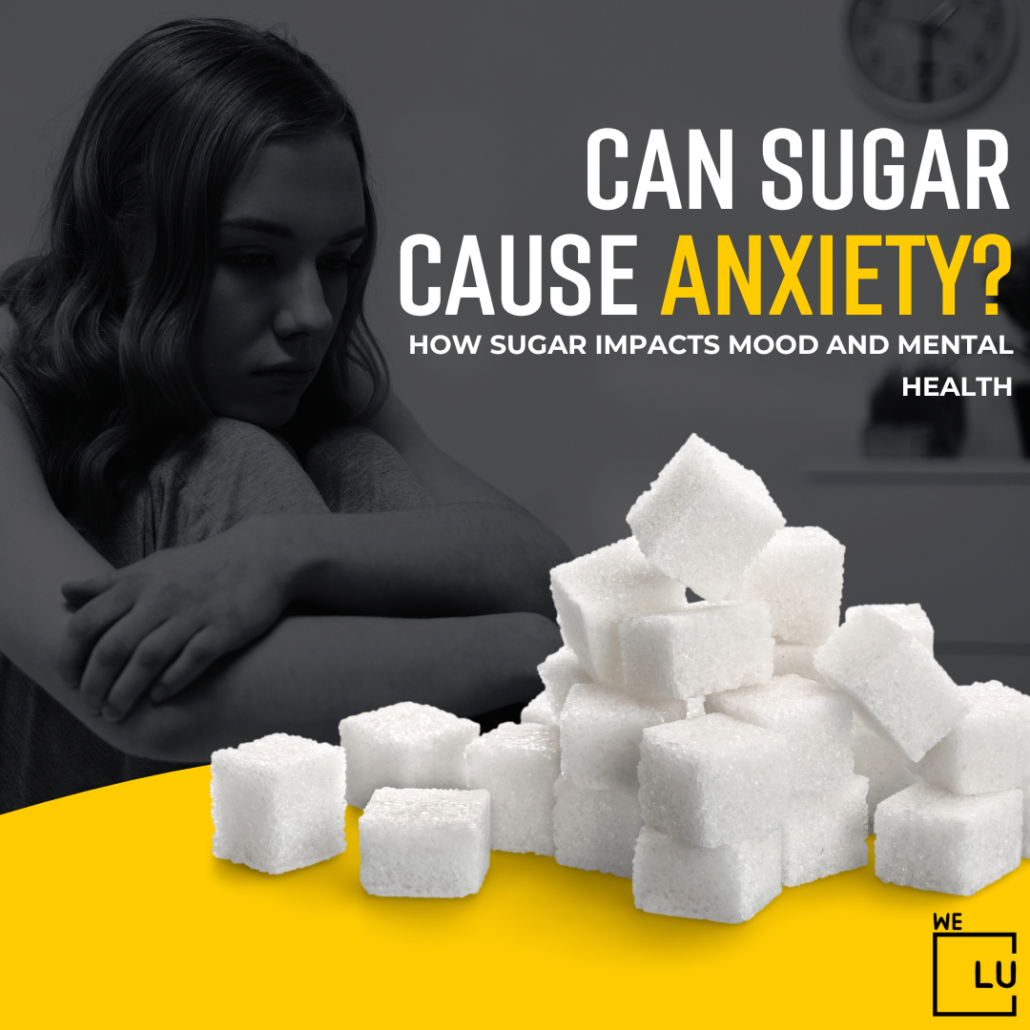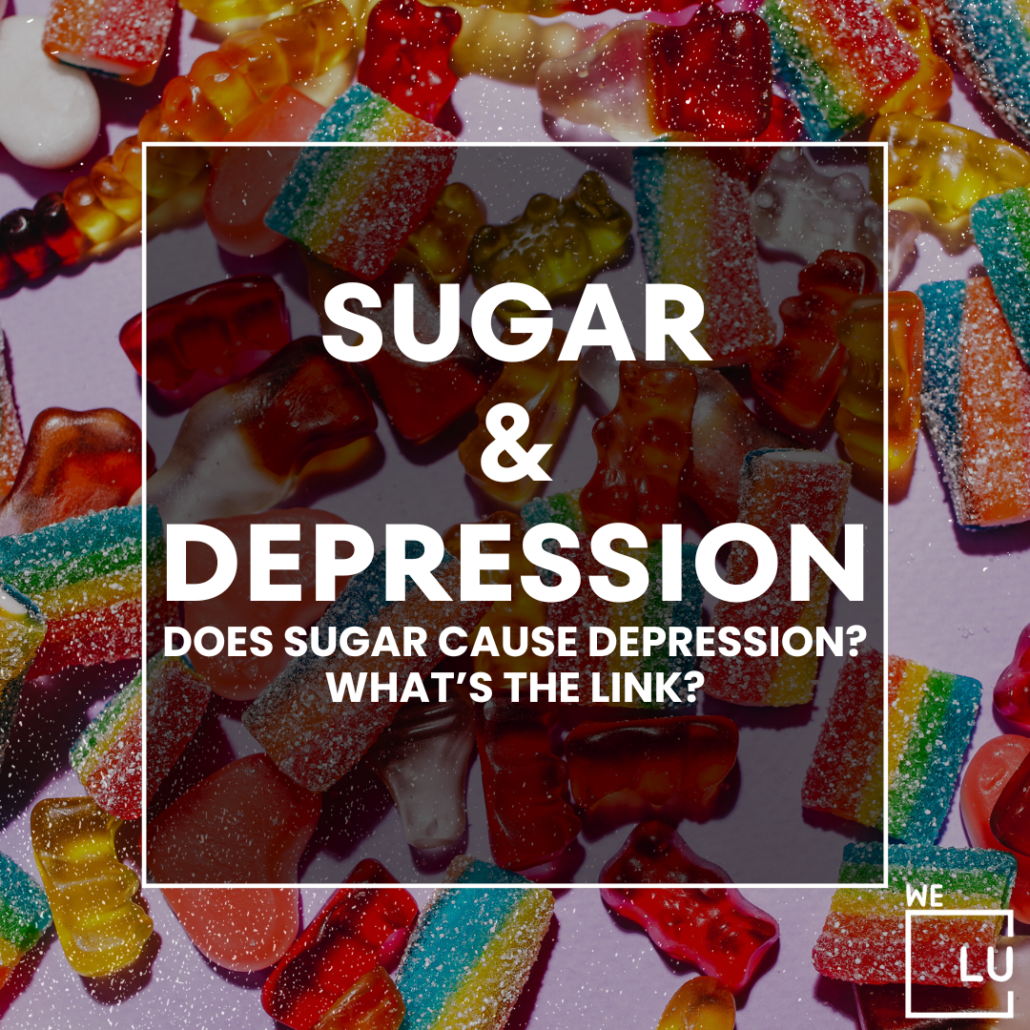Can Sugar Cause Anxiety?
It’s widely known that excessive sugar consumption can lead to various issues. However, a majority of Americans continue to consume an excessive amount of sugar. Extensive research has detailed its adverse impact on physical health, prompting discussions on reducing sugar intake to mitigate the risk of chronic diseases.
Although cutting back on sugar can lead to physical health improvements, it’s equally important to consider its effects on mental health.
How Sugar Impacts Mood and Mental Health
Sugar consumption’s impact on mood isn’t just about a temporary “sugar rush.” Recent research suggests that sugary treats may not positively influence mood and could have long-term adverse effects. Studies linked high-sugar diets to an increased risk of mood disorders and anxiety in both men and women.
Sugar’s Role in Stress Response
Many people resort to sugary foods to cope with stress, yet such foods can weaken the body’s stress response. Sugar consumption has been found to suppress the brain’s stress response, making individuals less responsive to stress. While it might offer temporary relief, relying on sugar for stress relief could lead to obesity and its associated health risks.
Sugar’s Connection to Depression
Consuming sugar to manage emotions might exacerbate feelings of sadness or hopelessness. Multiple studies have linked high-sugar diets to depression by triggering imbalances in brain chemicals, increasing the risk of developing mental health disorders, and leading to a higher likelihood of receiving a clinical depression diagnosis within a few years.
Sugar Withdrawal and Anxiety-Like Symptoms
Quitting processed sugar can cause withdrawal symptoms resembling those of addictive substances, such as anxiety, irritability, and fatigue. Research has drawn parallels between sugar and substance misuse, suggesting that sudden cessation of sugar intake might mimic withdrawal, even triggering panic-like sensations, especially in individuals with anxiety disorders.
Sugar’s Impact on Cognitive Function
Emerging research indicates that excessive sugar intake can impair cognitive functions, affecting decision-making and memory. Studies, though primarily conducted on animals, suggest that diets high in sugar could detrimentally affect memory and appetite control in young, healthy individuals after a week.
Impact of Sugar Consumption on Anxiety
The odd sugary treat won’t make you anxious. However, research indicates that sugar-rich diets can affect your mood. Here is what the research indicates.
Researchers gathered information on 23,245 persons for a 2017 study. They discovered that after five years, men who consumed more sugar had a 23 percent increased likelihood of having common mental disorders (CMD).
Another recent study of 1,128 older persons indicated that those who consumed more sugar and saturated fat than they did were more likely to have higher levels of anxiety.
Additionally, it has been discovered that simple sugar-rich diets might cause inflammation and cognitive dysfunction. Both of these elements have the potential to exacerbate mental health issues, such as anxiety.
Unveiling the Link Between Sugar and Anxiety
Contrary to specific online claims, sugar itself doesn’t directly cause anxiety. Anxiety primarily pertains to mental health, and attributing its cause solely to dietary factors is unusual. Nonetheless, sugar consumption can induce bodily changes that might exacerbate anxiety symptoms or trigger sensations resembling anxiety attacks.
Impact on Anxiety-Prone Individuals
Individuals grappling with anxiety often become acutely sensitive to bodily sensations. Even mild feelings of tiredness, lightheadedness, or general unease can intensify their anxiety levels. While sugar isn’t the direct culprit behind these sensations, its consumption prompts various bodily responses. Glucose and the subsequent insulin release to manage it can lead to fatigue, cognitive challenges, and mild discomfort. Although these symptoms might not affect those without anxiety, they tend to heighten anxiety levels in individuals susceptible to panic attacks. Additionally, excessive sugar intake might result in stomach discomfort, potentially worsening or triggering anxiety.
Signs of Sugar-Related Symptoms
Sugar rushes, and subsequent withdrawal may exhibit physical symptoms akin to anxiety, such as trembling and nervousness. This is associated with the rapid surge of energy as glucose breaks down in the bloodstream. Although primarily observed after substantial sugar consumption, extended periods without eating post-consumption could lead to overstimulation, potentially intensifying anxiety symptoms.
Insights from Sugar and Anxiety Research
Animal studies provide intriguing insights. A 2008 study on rats indicated that a sugar binge followed by food deprivation led to a dopamine imbalance, correlating with heightened anxiety.
Similarly, a 2009 study suggested that prolonged sugar intake might impair memory and compromise one’s ability to cope with anxiety, although the exact mechanisms remain unclear. These studies underscore a potential connection between sugar consumption and its impact on managing anxiety.

Skip To:
Learn More:
- Anxiety Disorder Treatment
- Anxiety and High Blood Pressure
- Tea for Anxiety
- Is Anxiety a Disability? Can You Get Disability for Anxiety?
- Rehab for Depression & Anxiety Treatment
- What is the Best SSRI for Anxiety?
- Social Anxiety Disorder Test
- Grounding Techniques for Anxiety Attacks
- Mental Health Poems that are Powerful and Healing
- Short-Term Disability Mental Health
Get Help. Get Better. Get Your Life Back.
Searching for Accredited Dual Diagnosis Mental Health Centers Near You?
Even if therapy failed previously, or are in the middle of a difficult crisis, we stand ready to support you. Our trusted behavioral health specialists will not give up on you. When you feel ready or just want someone to speak to about counseling alternatives to change your life call us. Even if we cannot assist you, we will lead you to wherever you can get support. There is no obligation. Call our hotline today.
FREE 24/7 Dual Diagnosis Mental Health Services Hotline
Sugar and Nocturnal Anxiety
Consuming refined sugars can cause fluctuations in blood sugar levels, leading to anxiety and fatigue as adrenaline and cortisol are released during sugar crashes.
Relationship Between Sugar and Panic Attacks
Frequent fluctuations in blood sugar levels due to a high-sugar diet can trigger anxiety and, occasionally, panic attacks.
Dietary Approaches to Alleviate Anxiety
Certain foods rich in magnesium, zinc, and omega-3s, such as leafy greens, fatty fish, eggs, and pumpkin seeds, have been linked to reduced anxiety symptoms.
Calming Effects of Specific Foods
Dark chocolate, turmeric, chamomile, yogurt, green tea, and Brazil nuts have shown potential in reducing anxiety symptoms due to their anti-inflammatory and antioxidant properties.
Warnings on Dietary Modifications
While some foods may aid in managing anxiety, maintaining a balanced intake and avoiding excessive consumption, particularly of selenium-rich foods like Brazil nuts, is crucial. Overconsumption of certain nutrients might have adverse effects.
Considerations for Anxiety Management
Dietary modifications might play a role in reducing anxiety, but individual responses to these foods can vary. Maintaining a balanced diet and consulting a healthcare professional before making significant dietary changes is recommended.

End the Emotional Pain. Get Your Life Back.
Feeling Depressed, Anxious or Struggling with Mental Health Illness? Get Safe Comfortable Mental Health Dual Diagnosis High-Quality Therapy From Counselors That Care. Begin Your Recovery Now.
Hotline (855) 940-6125Blood Sugar Fluctuations and Anxiety
Impact of Low Blood Sugar on Anxiety
Low blood sugar triggers the release of adrenaline, leading to symptoms like sweating, mood changes, and anxiety. The interaction between cortisol and adrenaline hormones plays a significant role in this reaction.
Anxiety Effects on Blood Sugar in Non-Diabetics
Anxiety in individuals without diabetes can result in weight gain and high cholesterol, affecting blood sugar levels. The stress-induced release of hormones like cortisol and adrenaline can impact the body’s insulin production and glucose regulation.
Stress, Anxiety, and High Blood Sugar
Stress and anxiety can cause a surge in blood sugar levels due to the release of stress hormones. The body responds by preparing for a “fight or flight” scenario, triggering an increase in heart rate, blood pressure, and blood sugar.
Chronic Effects of Persistent Anxiety
Continual stress-induced blood sugar spikes can pose risks, including heart disease, high blood pressure, sleep disturbances, and mental health conditions like chronic anxiety and depression.
Relationship Between Anxiety and Blood Sugar Rise
Intense anxiety can lead to hormonal changes, influencing glucose and cortisol levels, insulin release, and insulin sensitivity, ultimately impacting blood sugar regulation.
Can Anxiety Cause Blood Sugar to Rise?
High levels of anxiety can cause the release of sympathetic hormones, which can increase glucose and cortisol levels, decrease insulin release, or alter the sensitivity and resistance of the insulin hormone.
Does High Blood Sugar Feel Like Anxiety?
A rising body of research points to a connection between mood and glycemic (blood sugar) highs and lows. It has been demonstrated that signs of poor glycemic control closely resemble mental health signs like irritation, anxiety, and worry. This shouldn’t be surprising because glucose is the primary fuel for the brain.
Can a Sugar Crash Cause Anxiety?
A recent study reveals that sugar may increase your chance of developing mood disorders like anxiety and depression symptoms, in addition to the sugar crash, which is the immediate spike and subsequent drop in blood sugar levels after eating.
Similar to how sugar rush and withdrawal can resemble some of the physical signs of anxiety, including trembling and uneasiness, This is related to the energy rush you experience as your bloodstream breaks down glucose to release quick bursts of energy.
However, depending on what you eat and how long you wait before eating again, you may be in danger of overstimulating your body and making anxiety worse if you eat sugar. For the majority of people, this only happens after significant sugar consumption.
Although these symptoms aren’t the cause of your anxiety, if you already have it, the additional trembling and tension may exacerbate it.

First-class Facilities & Amenities
World-class High-Quality Mental Health Services & Behavioral Health Substance Abuse Treatment
Rehab Centers TourRenowned Mental Health Centers. Serene Private Facilities. Inpatient Rehab Programs Vary.
Mental Health Helpline (855) 940-6125Proven recovery success experience, backed by a Team w/ History of:
15+
Years of Unified Experience
100s
5-Star Reviews Across Our Centers
10K
Recovery Successes
- Comprehensive Dual-Diagnosis Treatment
- Complimentary Family & Alumni Programs
- Coaching, Recovery & Development Events
- Comfortable Onsite Medical Detox Center
The Gut-Brain Connection: Understanding Gut Health and Anxiety
Exploring the Gut-Brain Axis
Research emphasizes the relationship between intestinal well-being and mental health. A person’s diet and the use of probiotics may play a crucial role in enhancing both gut health and mental wellness.
Gut Health and Anxiety Disorders
Anxiety disorders, the most prevalent mental health issues in the United States, are interconnected with approximately 100 million digestive-related ambulatory care visits annually. Investigating the “gut-brain axis” explores how gut bacteria and communication between the gastrointestinal system and the brain may influence anxiety and gastrointestinal diseases.
The gastrointestinal system’s intricate network of organs, neurons, hormones, and microorganisms affects digestion. Communication between the central nervous system (CNS) and the enteric nervous system (ENS) can influence various cognitive and emotional functions. This connection might impact mood swings and emotional changes among individuals with digestive disorders like Irritable Bowel Syndrome (IBS).
The Microbial Influence
The gut microbiome of diverse microorganisms is vital for immune regulation and energy conversion. Alterations in the gut microbiota due to stress and depression might influence mental health. Stress-related changes in the gut microbiota can release compounds affecting mood, eating behavior, and overall well-being.
Inflammatory cytokines, released during gastrointestinal inflammation, might contribute to depressive and anxious feelings. Studies suggest a significant association between anxiety, depression, and Irritable Bowel Syndrome (IBS), indicating a potential causal relationship that requires further investigation.
Animal studies highlight how gut bacteria affect stress responses and behavior, impacting anxiety-like tendencies. Recent reviews emphasize the role of the gut microbiota in regulating the hypothalamic-pituitary-adrenal (HPA) axis, an integral component in stress regulation.
The Interplay of Gut Health and Mental Wellness
Understanding the intricate relationship between gut health and anxiety sheds light on the potential impact of the gut-brain axis on mental well-being, emphasizing the need for further research to unveil this intricate connection.
World-class, Accredited, 5-Star Reviewed, Effective Mental Health Dual Diagnosis Programs. Complete Integrated Inpatient Rehab with Free Post Discharge Therapy Planning.
CALL (855) 940-6125End the Emotional Pain Rollercoaster. Gain Stability & Happiness Through Recovery Treatment. Start Mental Health Counseling Today. Get Free No-obligation Guidance by Behaviroal Health Specialists Who Understand Mental Health Recovery.
We Level Up Dual Diagnosis Treatment
The exact definition of dual diagnosis (also referred to as co-occurring disorders) can differ between institutions. However, it is generally described as the specific treatment of someone who has been diagnosed with a substance use disorder and a mental health disorder at the same time. Treating dual-diagnosis clients is a critical aspect of our inpatient treatment experience because co-occurring disorders are strongly correlated with instances of substance abuse.
Creating a treatment plan that addresses the physical aspects of withdrawal, the psychological connection with drug use, and managing underlying mental health disorders is part of setting clients up for success. A thorough mental health analysis identifies possibilities for treatment. Meeting with mental health counselors and medical care providers means access to behavioral therapy and medication treatment. At our dual diagnosis treatment center, We Level Up can implement the highest quality of care.
We recognize the fragile complexities of how mental and substance abuse disorders can influence others and sometimes result in a vicious cycle of addiction. That’s why we offer specialized treatment in dual-diagnosis cases to provide the most excellent chance of true healing and long-lasting recovery.
It can be challenging to accept that you may be living with a mental illness, but once it is properly diagnosed and treated, treating the presenting case of substance abuse can be magnitudes easier. Only a properly trained medical professional can diagnose these underlying conditions. If you believe you are suffering from a disorder alongside addiction, we urge you to seek a qualified treatment center to begin your journey to recovery. Call We Level Up today.
Experience Transformative Recovery at the We Level Up Treatment Center.
See our authentic success stories. Get inspired. Get the help you deserve.



Start a New Life
Begin with a free call to a behavioral health treatment advisor. Learn more about our dual-diagnosis programs. The We Level Up treatment center network delivers recovery programs that vary by each treatment facility. Call to learn more.
- Personalized Care
- Caring Accountable Staff
- World-class Amenities
- Licensed & Accredited
- Renowned w/ 5-Star Reviews
We’ll Call You
Top 6 Non Addictive Anti-Anxiety Medications
Search We Level Up FL Can Sugar Cause Anxiety? Eat These Instead For Your Anxiety Resources
Sources
- Anxiety and Depression Association of America. (n.d.). Finding help is the key to taking charge and moving forward.
https://adaa.org/find-help Can sugar cause anxiety, sugar and anxiety, blood sugar and anxiety – Related Articles - Bardwaj B, et al. (2016). Death by carbs: Added sugars and refined carbohydrates cause diabetes and cardiovascular disease in Asian Indians.
https://www.ncbi.nlm.nih.gov/pmc/articles/PMC6139832/ Can sugar cause anxiety, sugar and anxiety, blood sugar and anxiety – Related Articles - Birdi G, et al. (2016). Quality of life, stress, and mental health in parents of children with parentally diagnosed food allergy compared to medically diagnosed and healthy controls.
https://downloads.hindawi.com/archive/2016/1497375.pdf Can sugar cause anxiety, sugar and anxiety, blood sugar and anxiety – Related Articles - Cappelletti S, et al. (2015). Caffeine: Cognitive and physical performance enhancer or psychoactive drug?
https://www.ncbi.nlm.nih.gov/pmc/articles/PMC4462044/ Can sugar cause anxiety, sugar and anxiety, blood sugar and anxiety – Related Articles - Feng C et al. (2019). Beyond avoidance: The psychosocial impact of food allergies.
https://link.springer.com/article/10.1007/s12016-018-8708-x Can sugar cause anxiety, sugar and anxiety, blood sugar and anxiety – Related Articles - Food allergies linked to childhood anxiety. (2017).
https://www.sciencedaily.com/releases/2017/06/170629134228.htm Can sugar cause anxiety, sugar and anxiety, blood sugar and anxiety – Related Articles - Goodwin RD, et al. (2017). Food allergy and anxiety and depression among ethnic minority children and their caregivers.
https://www.jpeds.com/article/S0022-3476(17)30602-9/fulltext Can sugar cause anxiety, sugar and anxiety, blood sugar and anxiety – Related Articles - The facts about anxiety and food allergies [Press Release]. (n.d.).
https://www.foodallergyawareness.org/behavioral-health/anxiety-and-depression/anxiety-and-food-allergies/ Can sugar cause anxiety, sugar and anxiety, blood sugar and anxiety – Related Articles - Norwitz NG, et al. (2021). Nutrition as a metabolic treatment for anxiety.
https://www.frontiersin.org/articles/10.3389/fpsyt.2021.598119/full Can sugar cause anxiety, sugar and anxiety, blood sugar and anxiety – Related Articles - Sadeghi O, et al. (2019). The association of whole and refined grains consumption with psychological disorders among Iranian adults [Abstract].
https://pubmed.ncbi.nlm.nih.gov/29189904/ Can low blood sugar cause anxiety, sugar anxiety – Related Articles - Santos CJ. (2018). Carbohydrate-enriched diet predisposes to anxiety and depression-like behavior after stress in mice [Abstract].
https://pubmed.ncbi.nlm.nih.gov/27472404/ Can low blood sugar cause anxiety, sugar anxiety – Related Articles - Shanahan L, et al. (2014). Are children and adolescents with food allergies at increased risk for psychopathology?
https://www.ncbi.nlm.nih.gov/pmc/articles/PMC4307934/





